The American automotive landscape has long been dominated by the pickup truck. For decades, these vehicles have resonated with drivers thanks to their commanding driving position, off-road prowess, and, crucially, their robust payload and towing capabilities. In 2023, data from Car and Driver highlighted this enduring popularity, revealing that trucks occupied the top three spots in U.S. vehicle sales volume.
However, while the appeal of trucks remains strong, the automotive industry is undergoing a significant shift towards electrification. This transition has been slower in the pickup segment, particularly for hybrid options. Historically, factors like higher production costs and concerns surrounding long-term maintenance and battery replacement have hindered the widespread adoption of hybrid pickups. Despite the obvious benefits of improved fuel economy, the initial price premium and potential battery expenses have given some buyers pause.
But the tide is turning. As electric vehicle technology matures and consumer awareness grows, the market is becoming increasingly receptive to hybrid solutions. Currently, the U.S. market offers a limited selection of hybrid pickup trucks, ranging from mild to full hybrid systems. This article will explore the current hybrid pickup landscape with a particular focus on the emerging segment of Hybrid Midsize Trucks, examining available models and exciting future contenders. We’ll delve into how these trucks are blending fuel efficiency with the ruggedness and utility expected from a pickup, offering a compelling option for a new generation of truck buyers.
Current Hybrid Midsize Truck Options
While the full-size truck segment has seen early hybrid entrants, the midsize category is now beginning to embrace electrification, offering more manageable dimensions and appealing fuel economy without sacrificing essential truck capabilities.
Toyota Tacoma Hybrid
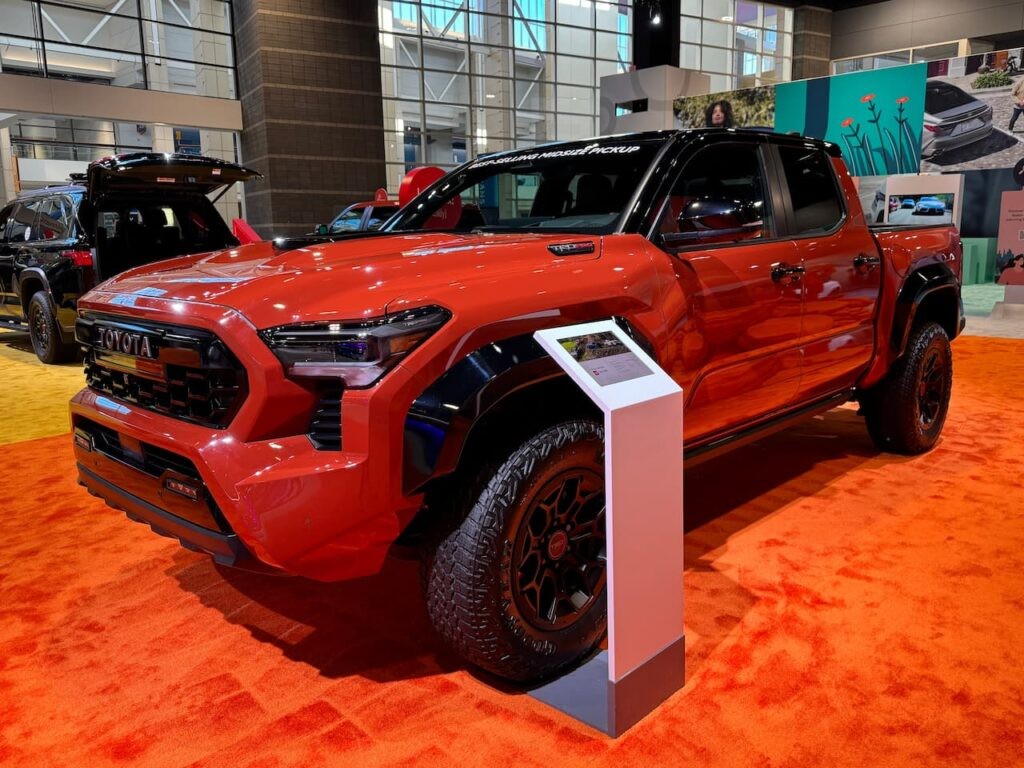 2024 Toyota Tacoma TRD Pro Terra front three quarter
2024 Toyota Tacoma TRD Pro Terra front three quarter
Image: The 2024 Toyota Tacoma TRD Pro Terra, showcasing the rugged design of Toyota’s new hybrid midsize truck offering.
Toyota, a leader in hybrid technology, has logically extended its electrification strategy to its popular Tacoma midsize truck. Building on the success of the Tundra Hybrid, the Toyota Tacoma Hybrid enters the market with a variety of configurations, including models specifically designed for off-road adventures and overlanding.
Specifications:
The Tacoma Hybrid utilizes a distinct i-Force Max powertrain compared to its larger sibling. This system combines a 2.4-liter turbocharged engine with a 48-horsepower electric motor integrated into an 8-speed transmission. Power is drawn from a 1.87 kWh Nickel-Metal Hydride (NiMH) battery pack. This hybrid system delivers a robust 326 horsepower and an impressive 465 lb.-ft. of torque. Fuel economy is EPA-estimated at up to 24 MPG combined, a significant improvement over traditional gasoline-only midsize trucks.
Price:
The Toyota Tacoma Hybrid starts at USD 47,815, including delivery, processing, and handling fees.
Why it matters for the midsize hybrid truck segment: The Tacoma Hybrid represents a significant step forward for midsize hybrid trucks. Toyota’s reputation for reliability and hybrid expertise, combined with the Tacoma’s established popularity, positions this truck as a key player in the segment. It offers a compelling blend of power, fuel efficiency, and off-road capability within a midsize package.
Other Notable Hybrid Trucks (Context for Market)
While the focus is on midsize, it’s important to acknowledge other hybrid pickup options that contribute to the overall market trend and provide context.
Ford Maverick Hybrid (Compact – Market Entry Point)
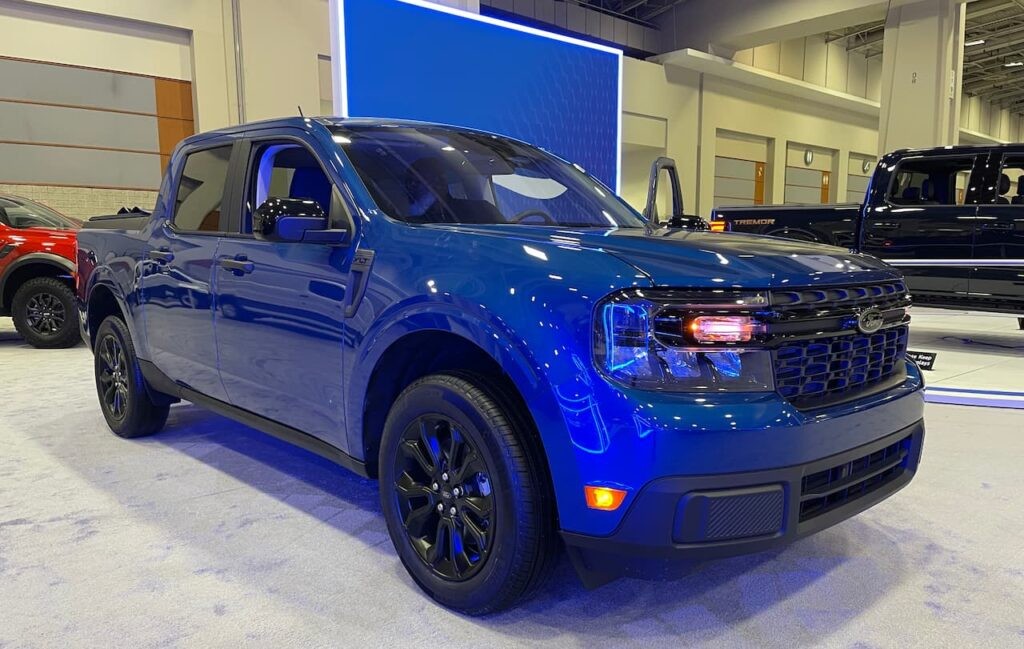 Ford Maverick front three quarter
Ford Maverick front three quarter
Image: The Ford Maverick, a compact hybrid pickup known for its affordability and fuel efficiency, contributing to the growing hybrid truck market.
The Ford Maverick Hybrid, while technically a compact truck, is crucial to mention as it demonstrates the market appetite for fuel-efficient trucks at a more accessible price point. Its success paved the way for broader hybrid truck acceptance.
Specifications:
The Maverick Hybrid employs a 2.5-liter Atkinson-cycle gasoline engine paired with a 94 kW electric motor and a 1.1 kWh lithium-ion battery. Combined output is 191 horsepower. It achieves an impressive 37 MPG combined fuel economy (FWD model year 2024). Towing capacity is rated at 4,000 lbs, and payload at 1,500 lbs.
Price:
The Ford Maverick Hybrid is the most affordable hybrid pickup, starting at USD 28,685, including destination and acquisition fees.
Relevance to Midsize Segment: While smaller, the Maverick Hybrid proves the demand for fuel-efficient trucks and sets a precedent for automakers to explore hybrid options across different truck sizes, including the midsize segment.
Ford F-150 Hybrid (Full-Size – Technology Demonstrator)
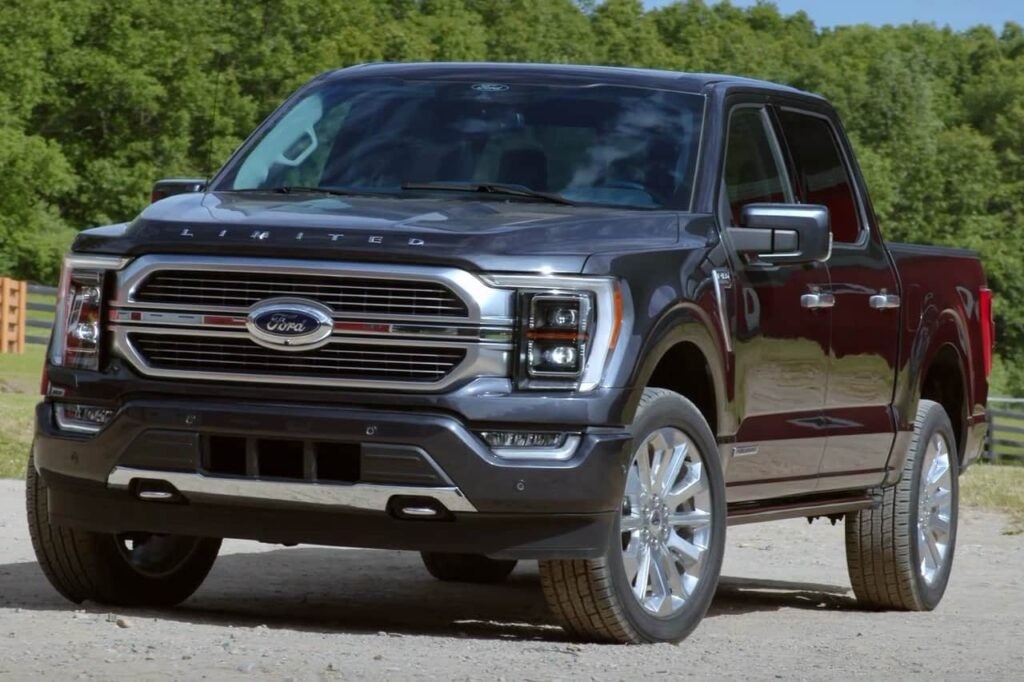 Ford F-150 Limited front three quarter
Ford F-150 Limited front three quarter
Image: The Ford F-150 Hybrid, a full-size truck showcasing Ford’s PowerBoost hybrid technology and its application in larger pickups.
The Ford F-150 Hybrid is a full-size truck, but it’s a significant example of hybrid technology being implemented in the pickup segment. It demonstrates that even larger trucks can benefit from electrification for improved fuel economy and power.
Specifications:
The F-150 Hybrid features a 3.5-liter PowerBoost full hybrid V6 engine mated to a 46.5 hp electric motor and a 1.5 kWh lithium-ion battery. The combined system delivers 430 hp and 570 lb.-ft. of torque. It achieves 23 MPG combined fuel efficiency and boasts a towing capacity of 11,200 lbs. and payload of 1,750 lbs.
Price:
The Ford F-150 Hybrid starts at USD 58,065, including destination and acquisition fees.
Relevance to Midsize Segment: The F-150 Hybrid showcases the potential of strong hybrid systems in trucks. The technology and market acceptance gained from full-size models like the F-150 Hybrid can trickle down and influence the development and appeal of hybrid midsize trucks.
Toyota Tundra Hybrid (Full-Size – Performance Hybrid)
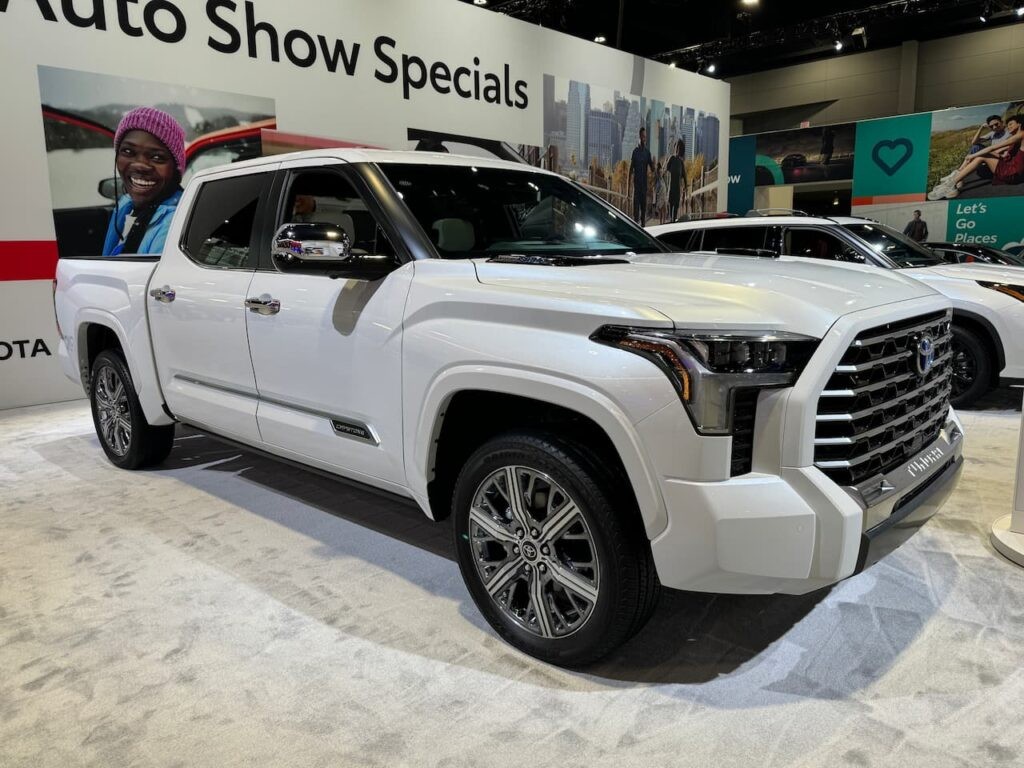 2024 Toyota Tundra Hybrid Capstone front three quarter
2024 Toyota Tundra Hybrid Capstone front three quarter
Image: The Toyota Tundra Hybrid Capstone, highlighting Toyota’s i-FORCE MAX hybrid powertrain in a full-size truck, emphasizing performance and capability.
Similar to the F-150 Hybrid, the Toyota Tundra Hybrid is a full-size offering that demonstrates the performance capabilities of hybrid powertrains in trucks.
Specifications:
The Tundra Hybrid utilizes the iForce Max 3.5-liter twin-turbo V6 hybrid powertrain, producing 437 hp and 583 lb.-ft. of torque. The electric motor contributes 48 hp and is powered by a 1.87 kWh NMC battery. Fuel economy is up to 22 MPG combined (2WD). Towing capacity is 11,450 lbs, and payload is 1,680 lbs.
Price:
The Toyota Tundra Hybrid starts at USD 59,950, including delivery, processing, and handling fees.
Relevance to Midsize Segment: The Tundra Hybrid further validates the viability of hybrid powertrains in trucks, showcasing that hybridization doesn’t compromise power and capability, and can even enhance it. This is a crucial message for the midsize segment, where buyers often prioritize both efficiency and ruggedness.
Ram 1500 eTorque (Full-Size – Mild Hybrid Technology)
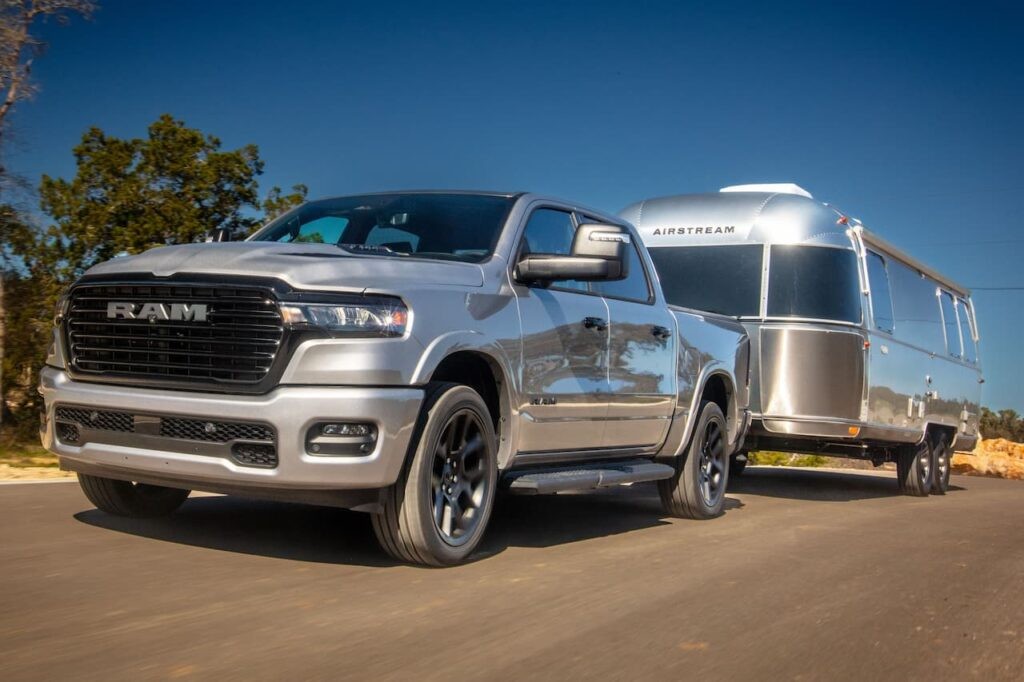 2025 Ram 1500 Laramie towing
2025 Ram 1500 Laramie towing
Image: The Ram 1500 eTorque Laramie towing, illustrating the mild-hybrid system’s contribution to fuel efficiency in everyday truck use and tasks.
The Ram 1500 eTorque uses a mild-hybrid system, a less aggressive form of electrification, but still relevant in the context of the evolving hybrid truck market.
Specifications:
The Ram 1500 eTorque employs a 3.6-liter V6 engine with a 48-volt mild-hybrid system. The system includes a belt-driven motor generator and a 0.43 kWh lithium-ion battery. The engine produces 305 hp and 271 lb.-ft. of torque. Fuel economy is EPA-estimated at up to 23 MPG (2WD).
Price:
The Ram 1500 eTorque starts at USD 42,270, including destination charges.
Relevance to Midsize Segment: The Ram 1500 eTorque demonstrates that even mild-hybrid technology can contribute to fuel efficiency in trucks. This approach might be considered for midsize trucks seeking to offer a more affordable entry into hybridization before fully committing to more complex systems.
Upcoming Hybrid Midsize Trucks: The Future is Bright
The future of the hybrid midsize truck segment is particularly exciting, with several manufacturers planning to introduce new models, further solidifying the trend towards electrification in this popular vehicle category.
Ram Mid-Size Pickup Truck (Hybrid Expected)
Ram has announced plans for a new midsize pickup truck, and while details are still emerging, strong indications suggest a hybrid powertrain will be a key component.
Expected Features:
While specific powertrain details are unconfirmed, industry speculation points towards a unibody construction based on the STLA Medium platform. Given the growing focus on electrification within Stellantis (Ram’s parent company), a hybrid powertrain is highly anticipated. Ram CEO Chris Feuell has hinted at surprises regarding the platform, suggesting a departure from traditional body-on-frame construction, potentially for improved efficiency and handling.
Expected Launch:
Production is tentatively planned to begin in 2027, though recent delays in the Belvidere Assembly Plant reopening add some uncertainty to the timeline.
Significance: A hybrid Ram midsize truck would be a major addition to the segment, leveraging Ram’s truck expertise and Stellantis’ electrification efforts. A unibody hybrid midsize Ram could offer a unique blend of comfort, efficiency, and truck utility.
Jeep Gladiator 4xe (Plug-in Hybrid Expected)
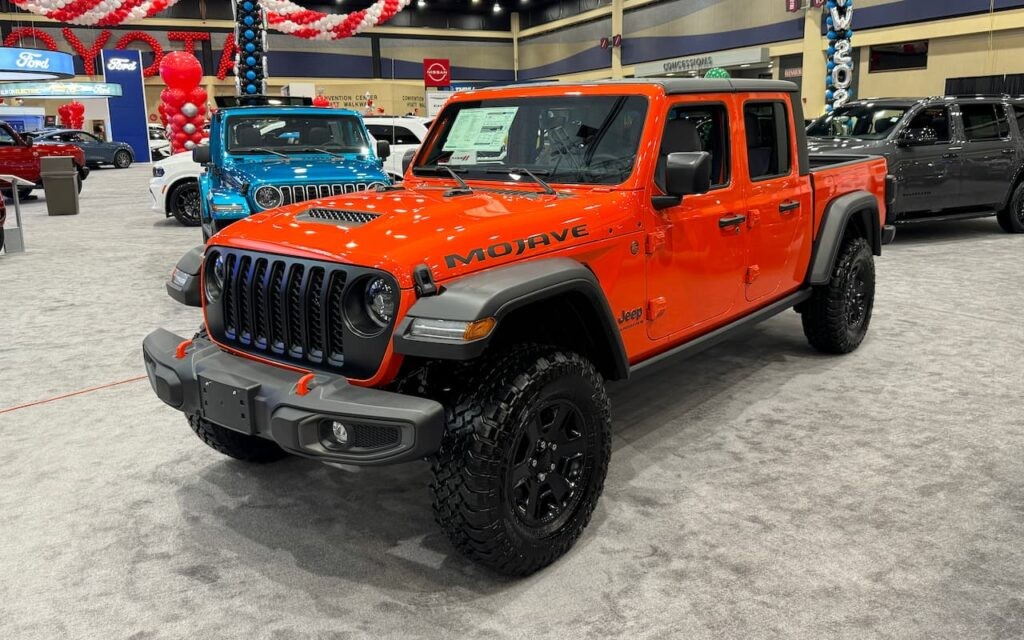 Jeep Gladiator front three quarters
Jeep Gladiator front three quarters
Image: The Jeep Gladiator, pictured in its gasoline version, with a plug-in hybrid 4xe variant anticipated to join the midsize hybrid truck market.
Jeep has confirmed a plug-in hybrid (PHEV) version of the Gladiator, the Gladiator 4xe, is slated for launch, further expanding the hybrid midsize truck options.
Expected Specifications:
The Gladiator 4xe is expected to share its powertrain with the Wrangler 4xe and Grand Cherokee 4xe. This would likely involve a 2.0-liter gasoline engine paired with two electric motors and a 17.3 kWh lithium-ion battery pack. Combined output is anticipated to be 375 horsepower and 470 lb.-ft. of torque. A pure-electric driving range of around 26 miles is also expected.
Expected Launch:
The Jeep Gladiator 4xe is expected to launch in 2025.
Significance: A plug-in hybrid Gladiator 4xe would be a compelling option for those seeking off-road capability with the added benefit of electric driving range for daily commutes or quieter trails. It would cater to the adventurous side of the midsize truck market while embracing electrification.
Toyota Tacoma Plug-in Hybrid (Potential Future Option)
While the current Tacoma Hybrid is a strong offering, Toyota is reportedly considering a plug-in hybrid version of both the Tacoma and Tundra, indicating a potential expansion of their hybrid truck lineup.
Potential Features:
Details are scarce, but a Tacoma Plug-in Hybrid, potentially named “Tacoma Prime,” could offer a larger battery pack and increased electric range compared to the standard hybrid. This would further enhance fuel efficiency and potentially allow for significant electric-only driving.
Timeline:
Toyota’s executive VP for North America has confirmed they are evaluating plug-in hybrid options, but production and release timelines remain unconfirmed.
Significance: A Tacoma Plug-in Hybrid would solidify Toyota’s leadership in the hybrid midsize truck segment, offering a more advanced electrified option for environmentally conscious truck buyers.
Conclusion: The Hybrid Midsize Truck Segment is Gaining Momentum
The hybrid midsize truck market is no longer a niche concept but a rapidly evolving segment poised for significant growth. While current options are still relatively limited, the arrival of the Toyota Tacoma Hybrid and the anticipated launch of the Jeep Gladiator 4xe, alongside the future Ram midsize hybrid truck, signal a clear trend.
These trucks are successfully addressing previous concerns about hybrid technology in pickups. They offer tangible benefits in fuel efficiency without sacrificing the core utility and capability that truck buyers demand. As technology advances and consumer acceptance grows, hybrid midsize trucks are positioned to become a mainstream choice, bridging the gap between traditional gasoline trucks and the fully electric future. For those seeking a balance of efficiency, capability, and a more responsible approach to driving, the hybrid midsize truck segment offers an increasingly attractive and compelling option in the automotive market.
